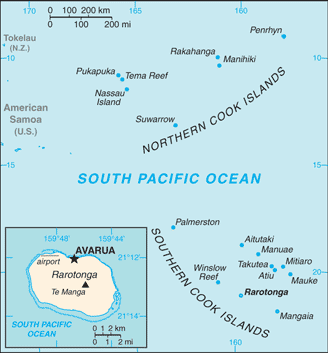Cook Islands

The Cook Islands acts in free association with New Zealand. In the conduct of its foreign affairs, the Cook Islands interacts with the international community as a sovereign and independent state. Responsibility at international law rests with the Cook Islands in terms of its actions and the exercise of its international rights and fulfillment of its international obligations. Located in the South Pacific Ocean about halfway from Hawaii to New Zealand, the Cook Islands has the right to move at any time to full independence by unilateral action. The Chief of State is the Queen of England through a representative, and the Head of Government is the Prime Minister. The Cook Islands enjoy a British legal tradition. The courts are efficient, honest, and transparent and, due to the relatively light load of cases, the country is one of the fastest jurisdictions in the world. Cases in the Cook Islands High Court are heard by current and retired judges of the New Zealand High Court and can be scheduled within weeks.
The Cook Islands are a member of IMO, FAO, UNESCO and the UN Environmental Conference. They are not, however, a United Nations member. The capital is Avarua, and the principal language is English. The economy is based on tourism, fishing and financial services. New Zealand and Japan are the chief trading partners. The currency is the New Zealand dollar.
The fleet is comprised of 210 vessels including 37 SOLAS Ships with a combined Gross Tonnage of 116,453 GT and over 60 yachts. The Cook Islands Register is considered a flag of convenience by the ITF. The Registry is governed by the Ship Registration Act, 2007 and the Maritime Transport Act, 2008.

